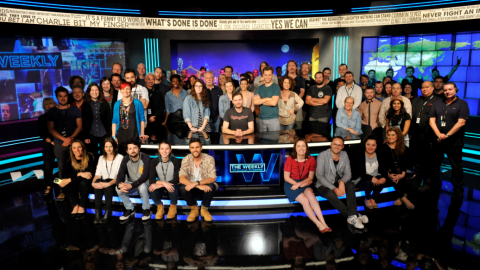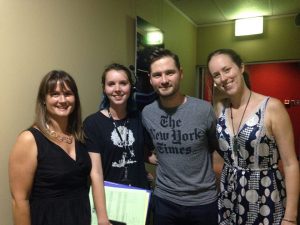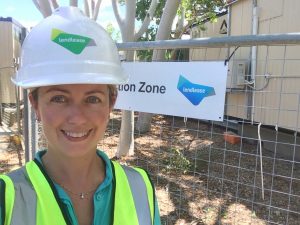Our Fearless Women

Do What you Love
Sarah Lang, Class of 2010
St Catherine’s School Dux 2010
I am a Junior Scripted Development Producer with Princess Pictures. This long job title essentially means that I help the company to develop new television shows. I am responsible for workshopping new show ideas, reading and editing scripts, researching stories and preparing pitch documents. I can be across as many as a dozen shows at a time, from brand new ideas all the way to shows on air at the moment. It is creatively challenging but very stimulating – I can find myself writing a pitch for a children’s series, discussing the plot of a murder mystery and reading a script for a sketch comedy, all in a day’s work!
What is your career background?
I graduated university five years ago, and have been working in the TV industry ever since. My first job was as a script coordinator on Fat Tony & Co, a spin-off of Underbelly, and I was way out of my depth as a brand new graduate. They teach you a lot of things at film school, but not the really important stuff, like how to fend off six other departments to get access to the photocopier! As well as scripting, I have branched out into several other roles, such as casting assistant, production secretary and production coordinator, on a range of shows including House Husbands, Wolf Creek, Rosehaven and Get Krackin’.
What have been two of your greatest career achievements to date?
 As I am only one member of a large department, I can’t lay claim to the accolades and awards that my shows have garnered, but there are some more humble achievements that I am proud of. One was the first time I saw my credit appear on TV – squished in tiny, unreadable font at the bottom of the screen – when Fat Tony & Co aired. It was a bit of a dream come true, and the small thrill of catching yours and your friends’ names on screen never wears off. Another was being able to take my family and two of my ex-teachers from St Catherine’s backstage at The Weekly with Charlie Pickering to visit me at work in the studio. It is difficult to explain to people what I do every day, but somehow, seeing me in amongst all the action convinced my parents that I have ‘made it’ in the industry!
As I am only one member of a large department, I can’t lay claim to the accolades and awards that my shows have garnered, but there are some more humble achievements that I am proud of. One was the first time I saw my credit appear on TV – squished in tiny, unreadable font at the bottom of the screen – when Fat Tony & Co aired. It was a bit of a dream come true, and the small thrill of catching yours and your friends’ names on screen never wears off. Another was being able to take my family and two of my ex-teachers from St Catherine’s backstage at The Weekly with Charlie Pickering to visit me at work in the studio. It is difficult to explain to people what I do every day, but somehow, seeing me in amongst all the action convinced my parents that I have ‘made it’ in the industry!
What challenges have you faced professionally and how have you dealt with them?
The biggest challenge of my career is being a freelancer. My generation and those currently in school are entering a workforce that looks very different to that of our parents. We are often expected to market ourselves, to be flexible, and to get creative in order to find work in our chosen fields. A full-time job at a fixed workplace, year in year out, is simply not the reality for many people my age, and we must become accustomed to a degree of instability and uncertainty in our professional lives. Although this is a huge challenge, financially, psychologically and even physically, it does bring some great rewards. Over the past four years I have worked in five different cities in Australia, and I have had to develop the grit , resourcefulness and independence that it takes to manage my own career.
Thinking about your career progression, what study did you undertake post-school and how was it beneficial?
After finishing School, I went straight into a Bachelor of Film and Television at Bond University. I knew I wanted to study hands-on production instead of academic film studies, and I knew I wanted to experience living out of home, and I certainly fulfilled both of those wishes. My studies were highly beneficial, in terms of the technical skills that I learnt, but even more so in terms of the clarity that I gained about my areas of interest, and the like-minded people I met in my course. It took the full six semesters of my degree to narrow down exactly what I enjoyed and where I felt most fulfilled inside the film industry, and I feel fortunate to have done so – many of my friends have undertaken postgraduate studies in pursuit of that key understanding. Of course, there is no substitute for getting out there and actually doing whatever it is that you love.
Reflecting on your time at St Catherine’s how do you feel the School/staff/students assisted you?
There were several members of staff who played important roles in nurturing my interests and pushing my abilities while I was at School. I most admire how the staff and School supported my career decisions despite not always understanding them. After being a very academic and ambitious student at School, it came as a surprise to many people that my choice of tertiary study was less academic and did not require a high ATAR, however my teachers and peers respected my choices without judgement.
What advice would you have for current St Catherine’s students, particularly our VCE students, when selecting subjects, tertiary courses and careers?
My advice is not to be afraid – of non-traditional careers, of trying different types of study, of taking a year to work or travel before university. Fear of making a mistake or of disappointing others is sometimes a major factor when selecting subjects and courses, but it can paralyse you into inaction. I believe that navigating your career path requires a lot of self-knowledge and introspection, and the only way to learn about yourself is to get stuck in and make some mistakes!
My experiences so far have taught me the following: You will always score better in a VCE subject that you enjoy, as opposed to one that scales well or that looks good on paper. You will get more out of a tertiary course if you really want to learn or develop a skill – if you don’t feel this urge, your time might be better spent in a workplace. It is impossible to predict what your career path will look like in 25 years, so set short-term goals and look forward to one day working in a role that you haven’t even heard of yet!
Leading by Example in the Construction Industry
Ms Lucy Gowdie, Class of 2001
St Catherine’s School Dux, 2001
What is your current position and what does it involve?
 I am the Regional Commercial and Risk Manager for Lendlease Building in Queensland and the Northern Territory.
I am the Regional Commercial and Risk Manager for Lendlease Building in Queensland and the Northern Territory.
I sit on the Regional Senior Leadership Team and report directly to our General Manager. I am responsible for developing and delivering the Implementation Plan for the commercial function, which then forms part of the broader Annual Business Plan for our region.
I provide commercial and risk support and expertise in relation to all aspects of operations for Lendlease Building in Queensland and the Northern Territory, including tenders and projects in delivery.
I am the lead contributor to the commercial strategy for tender submissions, with responsibility for providing advice in relation to risk management and mitigation, and the finalisation of commercial schedules and departure tables.
I attend regular onsite reviews of our projects in delivery, where I provide guidance in relation to upstream and downstream commercial matters, optimisation of projected business margin and risk management issues.
I also take an active role in managing head contract and subcontract disputes, including negotiating with other parties, preparing and reviewing documentation and providing recommendations to the General Manager, Managing Director and other senior managers in relation to proposed settlement terms and parameters.
What is your career background?
| Date | Employer | Role(s) |
| 2007-2010 | Parsons Brinckerhoff Pty Ltd |
Civil Engineer Design Coordinator Graduate Engineer |
| 2010-2014 | Thiess Pty Ltd |
Commercial Lawyer Project Lawyer Senior Contract Administrator Contract Administrator |
| 2014 – present | Lendlease Building Pty Ltd |
Regional Commercial & Risk Manager Commercial Manager |
What has been one of your greatest career achievements to date?
I would consider my career to have had several notable achievements. As one of the youngest senior managers within my region, I am really proud of the work that I have delivered to date, and I enjoy the challenges that my role brings.
One of my most recent achievements is my contribution to the delivery of the $1.8 billion Sunshine Coast University Hospital project. This project was procured as a public private partnership, and Lendlease was appointed as the design and construct contractor.
For this project I provided significant support to the project team on contract and commercial issues over a two year period, including regular visits to site and engagement with various stakeholders. One of the key challenges of this project was for us to understand the complex contracting arrangements, and to manage the large number of subcontract packages that were required to be procured.
Ultimately we are very proud that this project was successfully delivered on time and will be able to provide a significantly improved level of healthcare for the Sunshine Coast community.
What challenges have you faced professionally and how have you dealt with them?
Despite increasing awareness surrounding the importance of gender diversity in Australia, we continue to face barriers to attracting and retaining women in the construction industry. When I say construction, it includes engineering, project management, architecture, and construction law – the entire industry.
I have worked in the construction industry for nearly ten years on projects across Australia and during this time the challenge of being a female in a male dominated industry has remained fairly constant.
Share of voice, job recognition, authority and leadership are just some of the aspects that come to mind. In saying this, I feel that through extensive study, dedication to the job and having the experience of working both on-site and in corporate has placed me in a strong position to succeed as a female in the construction industry.
It also helps that Lendlease, is really supportive of diversity – in fact, we were recently awarded the 2016 Employer of Choice for Gender Equality by the Australian Workplace Gender Equality Agency.
In a role that historically has never been held by a woman, I now feel that my biggest challenge is to ensure that I remain a positive role model and influential leader for not only my team but also other women in the construction industry.
I think that gender equality starts with a commitment from each and every one of us and should resonate daily through our actions and conversations.
Thinking about your career progression, what study did you undertake post-school and how was it beneficial?
The study I have undertaken post-school has all been very beneficial to me in my career. My undergraduate studies were in Civil Engineering and Law, and my post-graduate studies in Construction Law helped draw these two areas of study together.
Although I have learnt a huge amount through ‘on the job’ experience and from my many mentors, without my formal education and qualifications I would never have been successful in applying for the various roles I have performed over the years.
Reflecting on your time at St Catherine’s how do you feel the School/staff/students assisted you?
The message that “girls can do anything” was always strongly reinforced to us throughout my time at St Catherine’s. I think this helped me believe that I could successfully pursue a career in a traditionally male dominated industry.
What advice would you have for current St Catherine’s students, particularly our VCE students, when selecting subjects, tertiary courses and careers?
I think it is important that students do not restrict themselves to either focusing just on humanities subjects, or just on Mathematics and Science subjects. I selected a range of both types of subjects which made my studies more interesting and kept my options open for which tertiary courses I could pursue.
For students who enjoy an extra challenge, I also recommend taking on one university subject during Year 12. Personally, I chose to study Philosophy through Monash University. This was an interesting experience as the subject matter and structure of the course was quite different from a standard VCE subject. It allowed me to meet students from other schools who had also selected this subject, and although the subject was quite difficult, ultimately this was recognised through an effective ‘scaling up’ of my final mark.
St Catherine’s has a proud history of Old Girls influencing a number of industries. Do you have professional networks of Old Girls that you keep in contact with?
I have kept in touch with a number of girls from St Catherine’s primarily via social media. Unfortunately, I have not been able to attend our two most recent School reunions due to work commitments on project sites in remote areas.
I have seen promotional material published for a number of professional networking events that were held last year – I look forward to hopefully one day attending an event for those of us who are working in the Building and Construction Industry!


